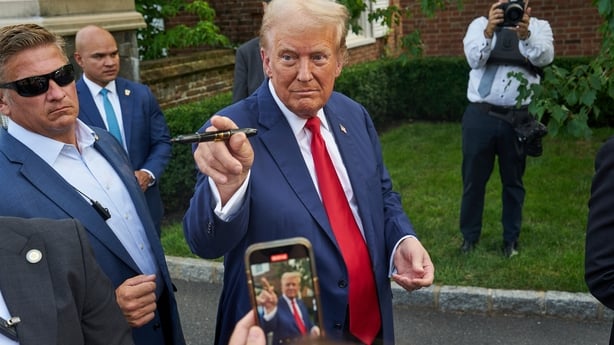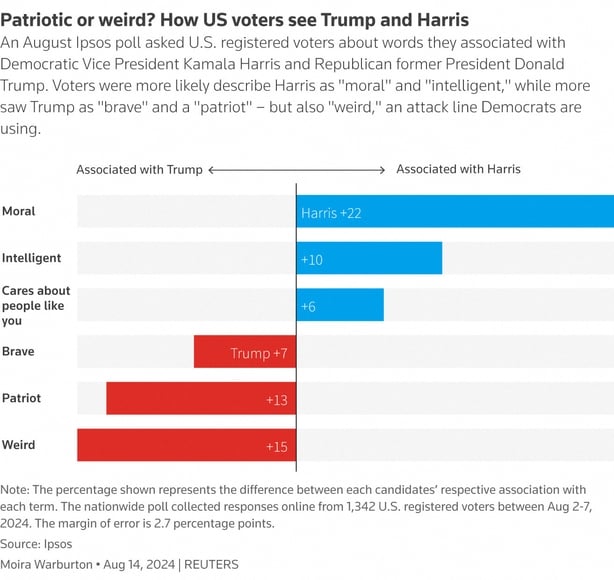Kamala Harris outlined proposals to cut taxes for most Americans, ban "price gouging" by grocers and boost affordable housing in her first major economy-focused speech as the Democratic presidential nominee.
The US vice president traveled to Raleigh, North Carolina, to discuss an agenda for her first 100 days in office if she wins the presidency.
During her speech, she pledged to introduce a new child tax credit of as much as $6,000 for families with infants, cut taxes for families with kids and lower prescription drug costs.
Ms Harris told supporters in the state that the US economy was the strongest in the world but prices were still too high.
She said she would focus on the middle class from the White House.
"I will be laser-focused on creating opportunities for the middle class," she said. "Together we will build what I call an opportunity economy."
Ms Harris aims to draw a contrast with her 5 November election opponent, Republican Donald Trump, on tariffs and taxes, aides say.
Her agenda may run into resistance from both corporations and Congress, who rejected similar proposals when they came from President Joe Biden.
Ms Harris' economic agenda broadly mirrors Mr Biden's, but introduces some new homebuying incentives and attempts to control high prices of goods.
Democrats are hoping to appeal to a broad segment of the working public who often see Republicans as better economic stewards and are anxious over both higher costs and their economic prospects.
Some of her policies, including ones on housing and groceries, have come under attack as ill-considered and overly liberal populism by Republicans and some industry groups.
Ms Harris' plan includes a federal ban on price gouging on food and groceries, which her campaign says aims to stop big corporations from unfairly exploiting consumers while generating excessive corporate profits.
As president, she will direct the Federal Trade Commission to impose "harsh penalties" on firms that break new limits on price gouging, campaign officials said.
Progressive economic ideas poll well with voters, but they have proven tough to pass into law.
Most of Ms Harris' and Mr Trump's economic priorities need to secure majority support in Congress. A child tax credit bill passed the House but stalled in the Senate this year.
Her plan calls for three million new construction units, a series of tax incentives and other measures to encourage building homes for first-time homebuyers and a $25,000 credit for such buyers.
Ms Harris also aims to expand rental assistance, ban rental price-fixing and stop Wall Street firms from buying homes in bulk.
She is also pushing to lower healthcare costs, cancel medical debt and highlight how the Biden-Harris administration negotiated down the prices of ten top-selling prescription drugs used by Medicare by as much as 79%.
Ms Harris is maintaining Mr Biden's promise not to raise taxes on people who make $400,000 or less a year, and her campaign aims to draw a contrast on taxes with Mr Trump, who slashed the corporate tax rate to 21% from 35% and implemented other tax breaks that are set to expire next year.
Mr Trump has promised to make the tax cuts permanent and suggested new across-the-board tariffs on imports, an idea Harris rejects.
Trump tackles Harris' economic record at press conference
Last night, Mr Trump sought to tie his Democratic rival to the Biden administration's economic record during a meandering, 80-minute press conference at his New Jersey golf club, his latest effort to blunt her momentum.
Flanked by tables stacked with assorted grocery items, Mr Trump blamed Ms Harris for the inflation that has caused the price of everyday goods to rise during Mr Biden's term in office.
"Harris has just declared that tackling inflation will be a day one priority for her," he said. "But day one for Kamala was three-and-a-half years ago. Where has she been?"
We need your consent to load this rte-player contentWe use rte-player to manage extra content that can set cookies on your device and collect data about your activity. Please review their details and accept them to load the content.Manage Preferences
The event was aimed at drawing a contrast with Ms Harris, who has rarely answered questions from reporters since replacing Mr Biden at the top of the Democratic ticket in late July.
But the press conference quickly became reminiscent of a Trump rally, with the former president levelling many of the same false claims he typically unleashes on the campaign trail and speaking for 45 minutes before taking his first question.

He insulted Ms Harris repeatedly, saying she is "not smart". When a reporter noted that some Republicans have urged him to focus on policy, rather than personal attacks, he said, "I think I'm entitled to personal attacks."
"She certainly attacks me personally," Mr Trump said.
We need your consent to load this rte-player contentWe use rte-player to manage extra content that can set cookies on your device and collect data about your activity. Please review their details and accept them to load the content.Manage Preferences
Mr Trump noted that Ms Harris has called him and his running mate JD Vance "weird", a criticism made viral by Democratic vice presidential candidate Tim Walz.
He also dismissed the suggestion that he alter his approach, telling reporters, "I have to do it my way."

Ms Harris' entry into the race has galvanised Democrats, and polls show she has erased the lead Mr Trump had enjoyed over Mr Biden.
The Harris campaign sent out a mock "media advisory" ahead of Mr Trump's press conference with the headline, "Donald Trump to Ramble Incoherently and Spread Dangerous Lies in Public, but at Different Home," a reference to his Bedminster estate.
Ms Harris is scheduled to deliver a speech on economic policy today in North Carolina.
The grocery staples Mr Trump used as props included household brands like Wonder Bread, Oreo cookies, Folgers coffee and Campbell's soup.
Bread and coffee prices have actually fallen over the last year, according to the US Bureau of Labor Statistics' monthly Consumer Price Index.
Food costs more broadly are now experiencing an inflation rate comparable with when Mr Trump was president - between zero and 2% a year.

